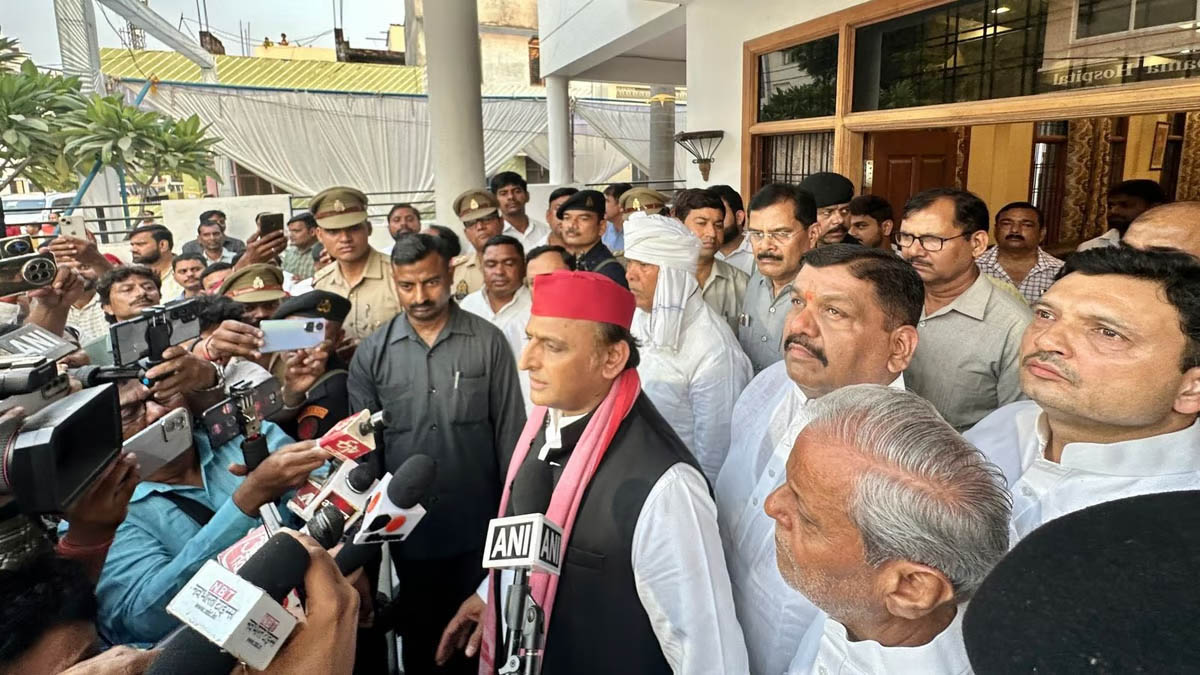Samajwadi Party (SP) chief Akhilesh Yadav has accused the Uttar Pradesh administration of deliberately orchestrating the recent communal violence in Bahraich. The clashes, which erupted in the Maharajganj area of Mahsi tehsil on October 13 during a Durga Puja idol immersion procession, led to the death of a 22-year-old man, Ram Gopal Mishra, who was killed by a gunshot. The violence escalated quickly, with mobs torching houses, shops, hospitals, and vehicles in retaliation.
Yadav, speaking to the media in Lucknow on the evening of October 17, questioned why there was no police presence at such a large event and whether the administration was truly unaware of the brewing tension. “This is a failure of the Bahraich administration and the government,” he said, adding that despite the government’s claims of zero tolerance, this incident points to a deeper malaise within law enforcement. As per the report of ThePrint, Yadav further alleged that the BJP was implementing a ‘divide and rule’ strategy reminiscent of British colonial tactics to stoke communal divisions for political gain.
Yadav also brought attention to reports that a journalist who captured the initial outbreak of violence was attacked by BJP workers, hinting at attempts to suppress coverage. “If they are beating journalists or sending them to jail under false pretences, one can only imagine what they are trying to hide,” he remarked, promising that his party would ensure justice for the victims’ families.
Rising threats to press freedom: Targeting of journalists in Bahraich and beyond
The violence in Bahraich also highlights a disturbing trend of attacks on journalists in Uttar Pradesh and across India. The National Alliance of Journalists (NAJ) and Delhi Union of Journalists (DUJ) recently voiced concerns about the increasing instances of threats and assaults on reporters. They specifically condemned the targeting of Muslim journalists in Bahraich by BJP MLA Shalabh Mani Tripathi, who inflamed tensions by questioning the impartiality of 13 Muslim reporters covering the violence. (Detailed report may be read here.)
Tripathi, a former media advisor to Uttar Pradesh Chief Minister Yogi Adityanath, took to social media platform X to single out these journalists, insinuating that their religious identity affected their reporting. While journalists from various religious backgrounds were covering the same event, Tripathi’s selective targeting of Muslims has raised alarm about the rising communal rhetoric surrounding journalism. The NAJ and DUJ condemned this divisive labelling of journalists, asserting that professionals should not be judged by their religious affiliation but by their commitment to truthful reporting.
Broader crackdown on journalists: Telangana arrest and The Caravan’s show-cause notice
The targeting of journalists is not limited to Bahraich, Utta Pradesh. The NAJ and DUJ also condemned the arrest of Telugu Scribe journalist Gowtham Pothagoni in Telangana. Pothagoni was arrested seven months after posting a video featuring a farmer praising former Chief Minister K. Chandrashekar Rao (KCR) and criticising the current administration. The journalist now faces multiple FIRs, including charges of attempting to incite public unrest. The media organisations have called for the immediate withdrawal of these charges, stating that Pothagoni was merely performing his journalistic duties by documenting public opinion.
Adding to these concerns is the recent action against The Caravan, a magazine known for its critical journalism. The Press Council of India (PCI) issued a show-cause notice to the magazine regarding its story titled “Screams from the Army Post”, which documented the alleged torture and deaths of civilians by Indian Army personnel in Jammu and Kashmir. Although the story had been taken down following an order from the Ministry of Information and Broadcasting (MIB), the PCI’s notice came seven months after the fact, raising concerns about the PCI’s role in enforcing government censorship rather than protecting press freedom.
Defending journalistic integrity: NAJ and DUJ’s call for unity
In response to these troubling developments, the NAJ and DUJ have called for greater solidarity among journalists to defend press freedom. They emphasised that journalism must remain a pillar of democracy and urged the Press Council of India to uphold its mandate to protect, not suppress, journalistic freedom. The organisations expressed concern that press freedom in India is increasingly under threat, as evidenced by the PCI’s overreach and the attacks on journalists in states like Uttar Pradesh and Telangana.
“The PCI cannot serve as a government censor,” the NAJ and DUJ said, underscoring the need for the body to prioritise the public interest over political pressure. They also highlighted that journalists play a crucial role in ensuring accountability and transparency in governance, and any attempt to silence them only undermines democratic values. In their concluding remarks, they reiterated the need for a unified front to protect the dignity, safety, and working conditions of journalists across the country.
The complete statement is as follows:
DUJ-NAJ Condemns Increasing Attacks on Journalists and expresses grave concern at the notice by the Press Council of India to independent and critical magazine ‘The Caravan’ regarding the story ‘screams from the army post’. #FreedomOfPress pic.twitter.com/sHlocKqjxU
— Delhi Union of Journalists (@DUJ1949) October 17, 2024
Related:
Supreme Court grants interim protection from arrest to UP journalist

